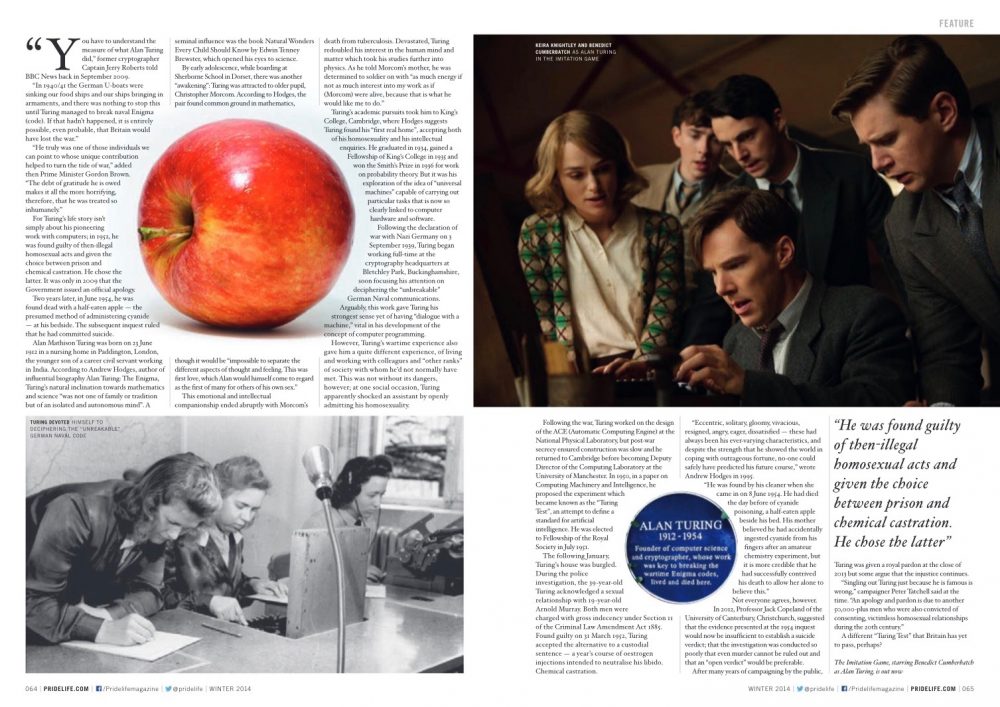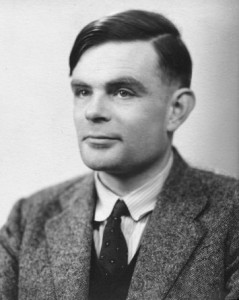
 60 years after his death, Paul F Cockburn looks back on the life and legacy of the ‘father of computing’, the gay mathematician Alan Turing.
60 years after his death, Paul F Cockburn looks back on the life and legacy of the ‘father of computing’, the gay mathematician Alan Turing.
“You have to understand the measure of what Alan Turing did,” former cryptographer Captain Jerry Roberts told BBC News back in September 2009. “In 1940/41 the German U-boats were sinking our food ships and our ships bringing in armaments, and there was nothing to stop this until Turing managed to break naval Enigma (code). If that hadn’t happened, it is entirely possible, even probable, that Britain would have lost the war.”
“He truly was one of those individuals we can point to whose unique contribution helped to turn the tide of war,” added then Prime Minister Gordon Brown, as part of an official Government apology issued soon afterwards. “The debt of gratitude he is owed makes it all the more horrifying, therefore, that he was treated so inhumanely.”
For Turing’s life story isn’t simply about his pioneering work with computers; in 1952, he was found guilty of then-illegal homosexual acts and given the choice between prison and chemical castration. He chose the latter. Two years later, in June 1954, he was found dead with a half-eaten apple—the presumed method of administering cyanide—at his bedside. The subsequent inquest ruled that he had committed suicide.
Alan Mathison Turing was born on 23 June 1912 in a nursing home in Paddington, London, the younger son of a career civil servant working in India. According to Andrew Hodges, author of influential biography Alan Turing: the enigma, Turing’s natural inclination towards mathematics and science “was not one of family or tradition but of an isolated and autonomous mind”. A seminal influence was Natural Wonders Every Child Should Know by Edwin Tenney Brewster, which opened his eyes to science.
By early adolescence, while boarding at Sherborne School in Dorset, there was another “awakening”; Turing was attracted to older pupil, Christopher Morcom. According to Hodges, the pair found common ground in mathematics, though it would be “impossible to separate the different aspects of thought and feeling. This was first love, which Alan would himself come to regard as the first of many for others of his own sex.”
This emotional and intellectual companionship ended abruptly with Morcom’s death from tuberculosis; devastated, Turing redoubled his interest in the human mind and matter which took his studies further into physics. As he told Morcom’s mother, he was determined to soldier on with “as much energy if not as much interest into my work as if (Morcom) were alive, because that is what he would like me to do.”
Turing’s academic pursuits took him to King’s College, Cambridge, where Hodges suggests Turing found his “first real home”, accepting both of his homosexuality and his intellectual enquiries. He graduated in 1934, gained a Fellowship of King’s College in 1935 and won the Smith’s Prize in 1936 for work on probability theory. But it was his exploration of the idea of “universal machines” capable of carrying out particular tasks that is now so clearly linked to computer hardware and software.
Following the declaration of war with Nazi Germany on 3 September 1939 , Turing began working full-time at the cryptography headquarters at Bletchley Park, Buckinghamshire, soon focusing his attention on deciphering the “unbreakable” German Naval communications. Arguably, this work gave Turing his strongest sense yet of having “dialogue with a machine,” vital in his development of the concept of computer programming.
However, Turing’s wartime experience also gave him a quite different experience, of living and working with colleagues and “other ranks” of society with whom he’d not normally have met. This was not without its dangers, however; at one social occasion, Turing apparently shocked an assistant by openly admitting his homosexuality.
Following the war, Turing worked on the design of the ACE (Automatic Computing Engine) at the National Physical Laboratory, but post-war secrecy ensured construction was slow and he returned to Cambridge before becoming Deputy Director of the Computing Laboratory at the University of Manchester. In 1950, in a paper on Computing machinery and intelligence, he proposed the experiment which became known as the “Turing Test”, an attempt to define a standard for artificial intelligence. He was elected to Fellowship of the Royal Society in July 1951.
The following January, Turing’s house was burgled. During the police investigation, the 39 year old Turing acknowledged a sexual relationship with 19 year old Arnold Murray. Both men were charged with gross indecency under Section 11 of the Criminal Law Amendment Act 1885. Found guilty on 31 March 1952, Turing accepted the alternative to a custodial sentence — a year’s course of oestrogen injections intended to neutralise his libido. Chemical castration.
“Eccentric, solitary, gloomy, vivacious, resigned, angry, eager, dissatisfied — these had always been his ever-varying characteristics, and despite the strength that he showed the world in coping with outrageous fortune, no-one could safely have predicted his future course,” wrote Andrew Hodges in 1995.
“He was found by his cleaner when she came in on 8 June 1954. He had died the day before of cyanide poisoning, a half-eaten apple beside his bed. His mother believed he had accidentally ingested cyanide from his fingers after an amateur chemistry experiment, but it is more credible that he had successfully contrived his death to allow her alone to believe this.”
Not everyone agrees, however: in 2012, Professor Jack Copeland of the University of Canterbury, Christchurch, suggested that the evidence presented at the 1954 inquest would now be insufficient to establish a suicide verdict; that the investigation was conducted so poorly that even murder cannot be ruled out and that an “open verdict” would be preferable.
After many years campaigning, Turing was given a royal pardon at the close of 2013 but some argue that the injustice continues. “Singling out Turing just because he is famous is wrong,” campaigner Peter Tatchell said at the time. “An apology and pardon is due to another 50,000-plus men who were also convicted of consenting, victimless homosexual relationships during the 20th century.”
A different “Turing Test” that Britain has yet to pass, perhaps?
First published by Pride Life magazine (Winter) #17